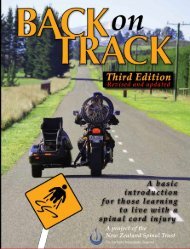o_19m515s4j1asl13rsiok91e166nh.pdf
Create successful ePaper yourself
Turn your PDF publications into a flip-book with our unique Google optimized e-Paper software.
Spinal Cord Impairment<br />
You have had an accident or illness that<br />
has resulted in a spinal cord injury or<br />
impairment (SCI). This chapter will begin<br />
to explain how your body works and how<br />
your impairment is affecting the way it<br />
functions. It is only an introduction to<br />
the range of effects your SCI may have on<br />
you. Spinal cord impairments are different<br />
from individual to individual. You may<br />
experience only a few of the effects or the<br />
full range. This book will get you started,<br />
make you hungry for more information, and<br />
raise more questions for you to ask. Talk to<br />
your medical professionals about what may<br />
be relevant for you.<br />
Stabilising<br />
Depending on the nature of your injury the<br />
position of your spine may need to be held<br />
still for some time. If your injury is to your<br />
neck, you may be on bed in traction, that is,<br />
with a small weight atta hed to head tongs.<br />
This helps to keep your bones in proper<br />
alignment while they heal. You would<br />
normally be in traction for six weeks.<br />
Immediate Treatments<br />
Surgery<br />
You may need surgery to stabilise the<br />
damaged bones of your spine. The bones<br />
may not be stable, there may be a noticeable<br />
deformity, or a bone fragment may be<br />
pushing onto the spinal cord. Often metal<br />
plates and screws are used to stabilise the<br />
spine and avoid further damage to the cord.<br />
Please bear in mind that stabilising surgery<br />
will only repair the bones of the spine.<br />
Other neck injuries may need a Halo ring and<br />
jacket, or a hard collar to keep the neck still.<br />
“Once you’ve got to [the unit] listen<br />
to all advice, staff [are] excellent<br />
(indeed marvellous) but very busy.<br />
Be persistent (but polite!) with your<br />
requests. Staff are very pressured,<br />
sometimes answers take a little time.<br />
Save your energy for the big issues.”<br />
Roy Dale L4/5<br />
© New Zealand Spinal Trust, 2014<br />
17
















